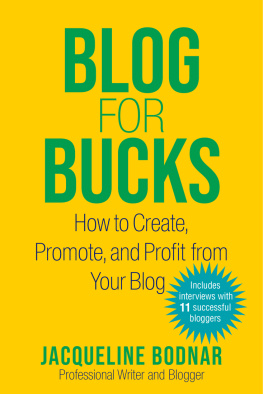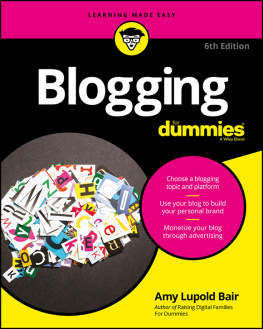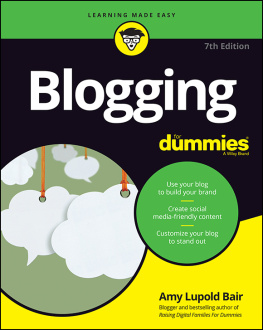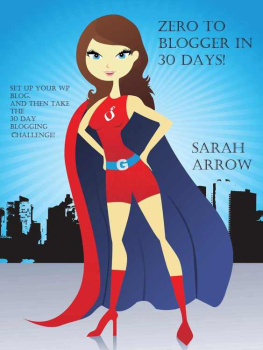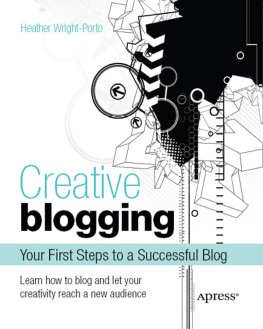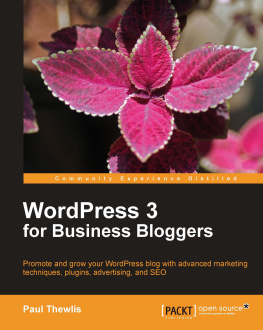All rights reserved. No part of this publication may be reproduced
in any form or by any means without written permission of the publisher.
with the Copyright, Designs and Patents Act 1988.
and any similarity with real people or events is purely coincidental.
A CIP record for this book is available from the British Library.
This book was produced using PressBooks.com.
Set up a Website and Blog for Your Book IN A DAY
The growth of the Internet, with its global reach and ready access to information, has dramatically changed the way books are published and will be published in future. Although some people still prefer reading printed books rather than having to read them off a screen, the fact that you can order a book online from stores such as Amazon or Barnes & Noble and (usually) have it delivered within a week or two, or publish your book for free on Amazon Createspace, or surf the Internet and easily find out more about a book and its author, or upload your book in digital format for people to download around the world in minutes, makes self-publishing a much more viable option today and selling and marketing your book much easier.
Moreover, the Internet is the fastest-growing marketplace for books, with online sales predicted to surpass bookshops and other traditional retail outlets within a decade. The fact is, if you are a published author (or plan to be one soon) you really should have a website. It is your own online real estate to do with as you would like, to promote you and your book, and designing one is much more affordable these days that you might think.
The first step in tapping into online consumer habits and technology is to create your own shop window on the Internet. The design and content of your website will depend on your marketing goals. If your aim is to raise your literary profile, to build up your name as a recognisable and respected author, then the structure of your website will differ from a website that focuses on just one book, for example.
Some authors, especially IT specialists, set up multiple websites to provide various shop windows for their writing. Yet, this can be counterproductive if you promote your site on your marketing stationery and give out multiple web addresses, it could be confusing. Still, the more you know about web design and search engine optimisation, the better positioned you will be to harness the power of the Internet to market your book.
Firstly, you can either try to build your own website, and there are plenty of free websites and low-cost tools that can provide you with a website of your own. However, nothing is ever entirely for free there is always a trade-off, and that trade-off is often click-through promotions, banner advertisements, etc., which can make your site look amateurish. Prospective readers and fans will often judge you and your writing based on the quality of your website, and if your website has all sorts of distracting links and third-party promotions streaming across it, then it will put people off. If you are not a professional web designer, then it is probably best to engage someone who has experience in designing websites, preferably for other authors, to do it for you.
Your first port of call in this regard might be someone in the family with web design experience who will help you as a favour. Alternatively, if there are no web designers in the family, the next idea is to ask someone you know who has published and has a professional-looking website whether they could recommend their designer. The third option would be to check your phone directory for local web designers, compare costs and check out samples of their work online, or if you know your way around it, the Internet abounds with companies.
If you can find a web designer that specialises in author websites, this generally helps as they will have templates, which they have used for other authors that will keep the cost down, and they will know what questions you are likely to ask and what issues are likely to arise. One company you might be interested in viewing is Book Promology (www.book-promotion.com).
Exercise 1. Put author website into your search engine and peruse through various author websites to get a general sense of the differences between them, as well as the common features. Write down the website addresses of three to four websites that you like most and the reasons why.
Many readers will know this already, but for those who are still new to the Internet, a professional web designer will generally have their own hardware called a server,, which hosts websites. Hosting means they are reserving space or bandwidth on their server, which will enable you to have your own website on the Internet. The cost of annually hosting your website will be included in the package they offer you. For example, let us say they quote 500 to create a website for you. This generally includes registering your chosen domain name, designing a basic website (which is all you need to start), and annual hosting of your website (there will be an ongoing annual charge for hosting, generally around 20). This might include ongoing maintenance to your site if you would like your designer to make occasional changes to the wording, for example.
Depending how well established the web designer is, they might try to sell additional services to you like adding links or keywords on your website, so that when people use various online search engines such as Google and Yahoo to look for subjects related to your book, they will be able to find and access your site (this is called search engine optimisation). Or they might offer you e-mail campaigns or other forms of promotional support. If you follow the simple site design and marketing advice offered here, you will not need to pay your web design company to promote your book for you. You should be able to do it yourself and track your progress, which is important in learning more about your target readership and how to reach them. This is difficult to do when someone else promotes your website and your book for you, and they do not have a weekly interest in checking the number of visitors to your site, other sites those visitors viewed before coming to your site, and so on.
As we mentioned previously, it would be better if you know someone personally, a trusted friend or family member, who can create a website for you. They should be able to help you register your domain name (such as www.davidcarter-author.com), host your website and make any ongoing changes at a substantially reduced rate. Ideally, they can train you to make your own changes in an easy and efficient way using software such as Coffee Cup Web Design, so that you can update and maintain you own website as and when you like. The more control that you, the author, have over the content on your website, the better.
Exercise 2. Choose a web designer for your book. They will usually host your site for you as part of their design package. Ask if they can teach you how to update your own website.




